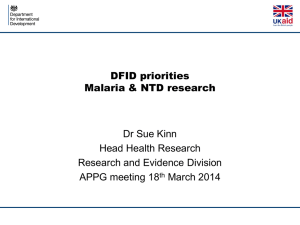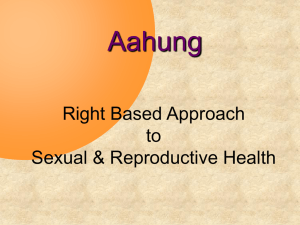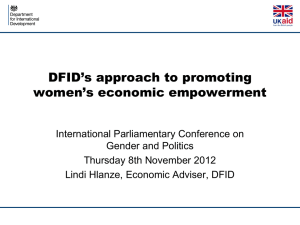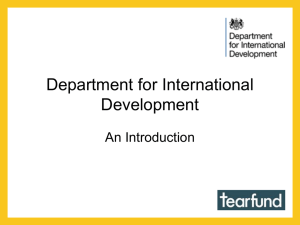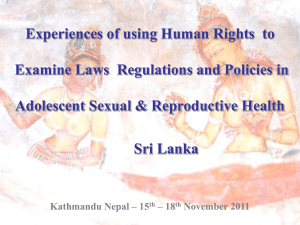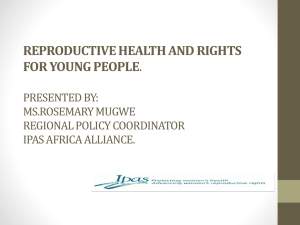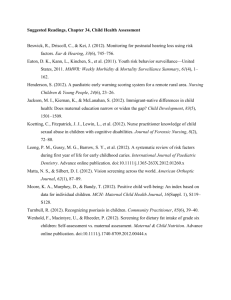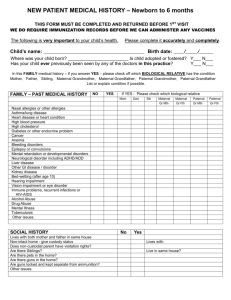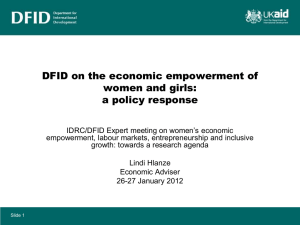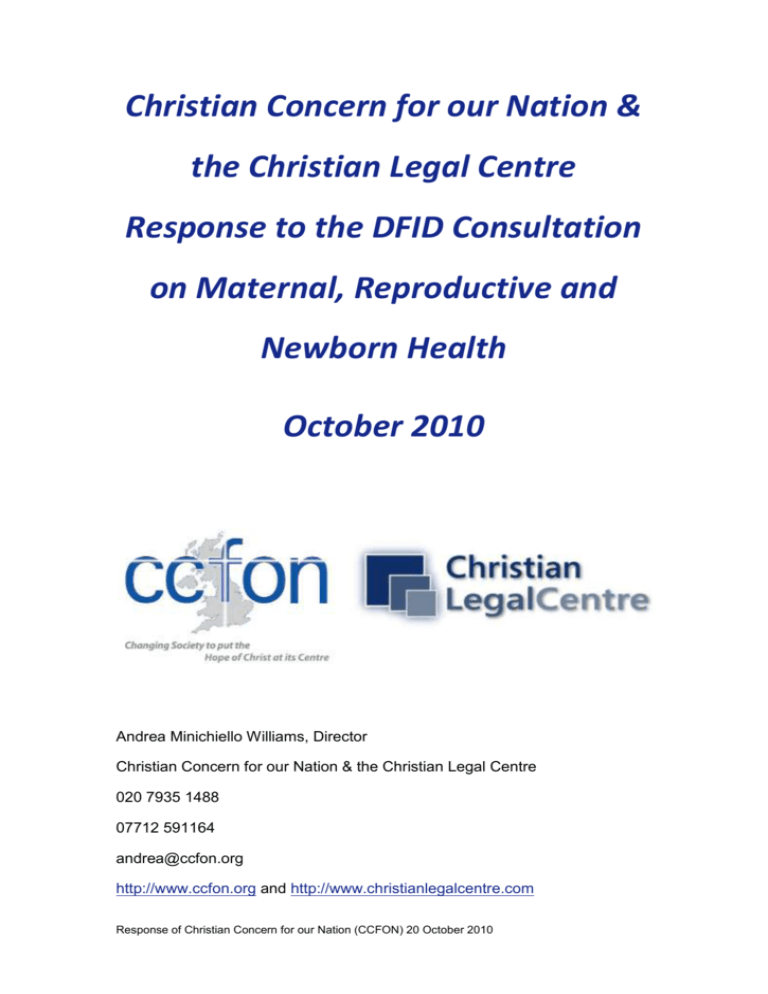
Christian Concern for our Nation &
the Christian Legal Centre
Response to the DFID Consultation
on Maternal, Reproductive and
Newborn Health
October 2010
Andrea Minichiello Williams, Director
Christian Concern for our Nation & the Christian Legal Centre
020 7935 1488
07712 591164
andrea@ccfon.org
http://www.ccfon.org and http://www.christianlegalcentre.com
Response of Christian Concern for our Nation (CCFON) 20 October 2010
About Us
Christian Concern for Our Nation (CCFON) is a policy and legal resource centre that
identifies changes in policy and law that may affect the Judeo-Christian heritage of
this nation. The team of lawyers and advisers at CCFON conduct research into, and
campaign on, legislation and policy changes that may affect Christian Freedoms or
the moral values of the UK. CCFON reaches a mailing list of 25,000 supporters.
http://www.ccfon.org
CCFON is linked to a sister and separate organisation, the Christian Legal Centre,
which takes up cases affecting Christian freedoms.
http://www.christianlegalcentre.com
Response to Consultation - Introduction
As a Christian organisation we believe that sex should take place within marriage
and that children should be raised ideally in a loving and stable home. We recognise
this is not always a reality and so we support the ABC policy – Abstinence, Be faithful
to one partner and use Contraception (in that order).
Making contraception widely available without a moral framework or sex education
training can achieve the reverse effect of what may be intended. The liberal
distribution of contraception may lead to a sharp rise in sexual activity, sexually
transmitted infections, unwanted pregnancies and unsafe abortions, especially in
adolescents and other vulnerable groups. Therefore contraception should only be
handed out when combined with sex education that promotes abstinence from sexual
activity outside of marriage.
We believe that life begins at conception and that everything should be done to
reduce the number of abortions. We do agree that the dangers of unsafe abortions
should be made more widely known. However, studies have shown that there is no
such thing as an entirely safe abortion – they always carry risk to the physical and
mental health of the mother.
Response of Christian Concern for our Nation (CCFON) 20 October 2010
Aims & Proposals
1. What should we aim to achieve?
Our ultimate aims are to improve women’s control of their reproductive lives and to save
mothers’ and newborn lives. Within the context of strengthening health systems to deliver
Response
for all and recognising that differentOur
countries
have different needs, what do you think that
we should be aiming to achieve?
You might like to consider the following options:
Reducing the number of unintended pregnancies
Increasing availability of and access to contraception (the contraceptive
prevalence rate)
Reducing the unmet need for family planning
Reducing the number of unsafe abortions
Reducing the adolescent fertility rate
Increasing the number of births attended by skilled birth attendants
Increasing newborn survival
Increasing the availability of prevention of mother-to-child transmission (PMTCT)
services
Improving maternal nutrition
Reducing the prevalence of malaria in pregnancy
Do you have any other ideas to share with us?
We suggest two key aims:
1. Reducing the number of unwanted pregnancies; and
2. Ensuring that all pregnant women receive the highest possible standard of
healthcare.
We believe that all pregnancies should take place within marriage and ideally in a
loving and stable family. We recognise that this is not always a reality and so we
support the ABC policy – Abstinence, Be faithful to one partner and use
Contraception (in that order).
Our Concerns
We are concerned about the proposal to increase the availability of contraception.
Providing contraception may decrease the spread of sexually transmitted diseases or
the occurrence of unwanted pregnancies, but only when it is provided in combination
with a moral framework and sexual education training.
When contraception is liberally distributed, it may encourage promiscuity, especially
among adolescents and those without sufficient sexual education training. It may give
Response of Christian Concern for our Nation (CCFON) 20 October 2010
the impression that sexually activity is acceptable, without communicating the need
for safety and the need to consider the risks that accompany this type of activity.
A lack of knowledge about sex and the results of sexual activity paired with an
unregulated distribution of contraception could result in a rise in sexual activity. If
sexual activity increases, it is reasonable to conclude that a rise in sexually
transmitted infections, unwanted pregnancies and unsafe abortions is also likely.
Prevention of unwanted pregnancies and disease is not the only concern with regard
to this issue. The care of women and newborns is also of the utmost importance.
Having a baby should be safe for all women.
Our Suggestions
Based on the above, we believe that contraception should only be handed out when
combined with sex education that promotes abstinence until marriage. Adolescents
should receive an education which informs them about the risks of sexual activity and
empowers them to say no to unwanted sex and forced marriage. In particular, it
should be made clear that contraception does not eliminate the risks that accompany
sexual activity.
DFID should work to ensure that adolescents (especially those under 16) are not
engaging in sexual activity, especially when they may be easily influenced or taken
advantage of by others. We believe that DFID should work to encourage the raising
of the age of consent in countries where it is currently below 16 years of age.
Based on our belief that all births should be safe for the mother and the child, we
propose that all pregnant women be given the highest possible quality of healthcare
for themselves and their new-born children, including a skilled attendant at delivery.
Clean water, basic sanitation and hygiene education are essential elements of
ensuring better health for mothers and their children.
Response of Christian Concern for our Nation (CCFON) 20 October 2010
A Prioritised Response
2. Which interventions should we prioritise?
DFID: Where should we focus our efforts along the continuum of care (pre-pregnancy, during
pregnancy and birth and after delivery) and why, in order to have an impact on MDG 5 by 2015? What
do you think is most important to tackle in order of time priority?
You might like to consider the following options:
Comprehensive family planning to enable women and men to make choices about their
reproductive lives and delay, space and limit their family size
Safe abortion services and to make the consequences of unsafe abortion more widely known
to ensure that abortion is safe, legal and rare
Antenatal care services
Skilled birth attendance (and/or institutional deliveries)
Post natal care services
Maternal nutrition interventions before and during pregnancy
Emergency obstetric care
Newborn care
Exclusive breastfeeding
Prevention and treatment of malaria for pregnant women
Prevention of mother to child transmission of HIV before, at and after birth
HIV prevention with sexual and reproductive health services
Health system strengthening (including health workers, medication, contraceptives and other
health commodities) to deliver quality services along the continuum of care
Specific sexual and reproductive health services for women who are survivors of violence or
rape
Do you have any other ideas to share with us?
Where appropriate please also indicate to which world region you are referring.
Our Concern
There is a lack of skilled health workers to assist women during their pregnancies.
We believe that the most important intervention is the provision of skilled health
workers who can advise and check women at all stages of pregnancy, and in
particular, the provision of skilled midwives who can be present during birth. DFID
should provide funds for the training of skilled health workers who are committed to
using their skills within their countries.
In addition to skilled health workers there is also a need for access to modern
equipment, clean water, good nutrition and drugs in many developing nations. We
agree that it is important to make the consequences of unsafe abortion more widely
known. However, we do not believe in abortion and do not believe it solves any
problems but rather can bring different problems of its own. It is essential that a
Response of Christian Concern for our Nation (CCFON) 20 October 2010
pregnant woman should receive counselling on the risks of abortion before the
abortion is carried out. After abortion, many women suffer psychiatric problems (see
our response to Question 6 below).
Our Suggestions
DFID should provide funds for the training of skilled health workers who are
committed to using their skills within their countries. Skilled health workers should
prioritise the safe delivery of healthy babies over the carrying out of abortions, to
ensure the safety of both mother and child.
DFID should ensure that a system is in place which enables equipment and drugs to
be provided as cheaply as possible to the developing world. DFID should also
ensures that such equipment and drugs are used in the developing world and not
exported back to richer nations.
We consider improving access to clean water and basic sanitation as an important
element of fulfilling MDG5. The availability of clean water at the time of delivery and
during the early years of childhood can make an enormous difference to the survival
rate of both mother and child (especially in relation to deaths from diarrhoea).
Breastfeeding should be encouraged (with assistance from health workers) for at
least the first six months of each baby’s life. DFID should put pressure on
multinational companies not to market formula milk in an irresponsible way in the
developing world. In particular, companies selling formula milk should be obliged to
ensure the provision of supplies of clean water with which the formula milk can be
mixed.
A further important intervention is the education of young people about sex and
relationships. They should understand that:
1. All sexual activity has risks – of pregnancy and of sexually transmitted
diseases – whether or not contraception is used and that the safest way is not
to have sex before marriage;
2. Risks are reduced if the ABC policy is followed: Abstinence before marriage,
Being faithful to a single partner and using Contraception; and
3. Children are best brought up within a stable loving family.
The implementation of such an ABC education policy has had great success in
Uganda, in particular in reducing the rate of HIV infection.
Response of Christian Concern for our Nation (CCFON) 20 October 2010
A Focused Effort
3. Where should we work?
DFID: Where should we focus our efforts to advance progress on
reproductive, maternal and newborn health?
You might like to consider the following options when thinking about the basis
of how we should prioritise where we work:
The lowest contraceptive prevalence rate
The highest unmet need for family planning
The highest absolute numbers of maternal deaths
The greatest lifetime risk of maternal death
The greatest inequities in access to services e.g between rich and
poor
Fragile states
A combination of all of the above
Our Suggestion
DFID should work wherever the aid money it provides can be used most effectively
and efficiently to reduce the numbers of unintended pregnancies, induced abortions
and maternal deaths.
Response of Christian Concern for our Nation (CCFON) 20 October 2010
Addressing Inequality
4. How should we address inequality?
DFID: What are the most important approaches that DFID/UK should consider to tackle inequalities in
reproductive, maternal and newborn health outcomes?
You might want to consider the following options:
Cash transfers and other mechanisms (such as vouchers and services that are free at the
point of use to pregnant women and children) that remove financial barriers faced by the
poorest and offer choice where relevant
Innovative and community based solutions for transporting women in need of referral
Making services women and girl friendly, tackling discrimination and exclusion within the
health system
Better and more transparent data to track if results benefit the poorest and to improve
accountability of impact and quality of provision
Our Suggestions
In order to reduce inequalities of expectation and aspiration between women and
girls, the most important factor is educating women to believe in their innate value
and dignity and to encourage them to abstain from sexual activity outside of
marriage. We also believe that men should receive similar training.
In order to reduce inequalities of access to medical services and facilities, it is
essential that those services and facilities be provided free of charge to those unable
to pay.
DFID should work with organisations that can reach the lowest income groups, such
as NGOs, women’s groups and other organisations such as like church-groups, to
ensure the provision of free education and of free family planning advice and
contraception within the ABC framework (see response to Questions 1 and 2 above).
We support the use of any scheme such as vouchers to ensure that women of the
lowest incomes can access education, medical services and facilities which ensure a
healthy pregnancy.
Response of Christian Concern for our Nation (CCFON) 20 October 2010
Empowering Women
5. How can we improve the realisation of women’s rights and women and
girls’ empowerment?
DFID: Which aspects of promoting women’s rights, empowerment, and choice should we
prioritise to help increase access to reproductive, maternal and newborn health?
You might like to consider the following options:
Political commitment to girls’ and women’s health at all levels
Girls’ education, including post-primary
Women’s economic empowerment (income and employment opportunities)
Legal frameworks for girls’ and women’s rights
Reducing violence against girls and women
Girls’ and women’s participation and organisation for their own and their babies’
health
Social change (social norms, attitudes and practices that drive girls’ and women’s
control over resources and own body)
Our Suggestions:
We believe that all men, women and children are worthy of equal respect.
It is essential that girls and women are empowered through education to understand
their own value and to give or withhold consent to marriage and to sexual activity.
Women and girls must be able to say no to sexual activity before marriage and to
have choice within a marriage. They must have a full understanding of the effects on
their bodies of sexual activity, pregnancy and birth.
Any legal frameworks for women’s rights need to be supported by sufficient practical
and/or educational programmes to ensure that women’s rights are respected and
laws complied with.
Social change projects should not result in the encouragement of greater promiscuity
and the breakdown of traditional family structures. Neither of these results is in the
best interests of women and girls.
Response of Christian Concern for our Nation (CCFON) 20 October 2010
The Neglected Issues
6. Which neglected and sensitive issues should we focus on?
DFID: We believe DFID has comparative advantage in tackling neglected and
sensitive issues. Which neglected and sensitive issues should we prioritise in our
work?
You might like to consider the following options:
Improving adolescents’ sexual and reproductive health and rights
Delaying age at first pregnancy
Improving access to safe abortion services
Reducing violence against girls and women
Addressing female genital mutilation/cutting
Addressing obstetric fistula
Our Suggestions
There are several issues which we believe that DFID should focus on.
The first issue is violence against women. We support all initiatives which lead to a
reduction of violence against women and of physical and mental threats to women by
their partners and others. We would like to see all women and children - and men respected and free from threats of violence. In particular we would like DFID to work
to reduce instances of female genital mutilation/cutting, and of rape with a view to
forced marriage and forced conversion to Islam.
The second issue is raising the age of consent. We support initiatives which lead to
the raising of the age of consent where it is currently below the age of 16, the
reduction in the numbers of marriages involving girls under the age of 16, and the
reduction in the number of pregnancies among girls under the age of 20.
We strongly believe that so-called “safe” abortion should not be promoted as a
means of family planning. There is no evidence that legalising abortion has had any
discernable impact on maternal mortality in any country.
No abortion is entirely safe. Many women that have had abortions have subsequently
suffered from a wide variety of psychiatric problems including serious depression,
anxiety over future infertility, sleeping problems and eating disorders.
Recent research from New Zealand by Fergusson DM and others, Reactions to
abortion and subsequent mental health, has shown that women “having an abortion
and reporting negative reactions had rates of mental health disorders that were
approximately 1.4–1.8 times higher than those not having an abortion” (see The
British Journal of Psychiatry (2009) 195: 420-426, abstract).
Response of Christian Concern for our Nation (CCFON) 20 October 2010
Fergusson concluded from a 30 year study, Abortion and mental health disorders,
published in 2008 that: ”First, exposure to abortion is an adverse life event which is
associated with a modest increase in risks of mental health problems. Second, the
mental health risks associated with abortion may be larger, and certainly are not
smaller, than the mental health risks associated with unwanted pregnancies that
come to term” (see The British Journal of Psychiatry (2009) 195: 83-84).
Recent research has also shown that there is a significant increase in premature
births amongst women who have had an abortion. (see Rooney and Calhoun,
Journal of American Physicians and Surgeons, 8 (2), 2003, 46-49.)
For all these reasons we would emphasise the need to reduce unwanted
pregnancies rather than to improve access to “safe” abortion services.
Multilateral Aid
7. How can we deliver better results through multilateral aid?
DFID: How can we deliver better results through multilateral aid?
Taking into account the list in the background information provided, who do you think DFID/UK
should work with to improve reproductive, maternal and newborn health? Please give reasons
for the organisations you have chosen.
Our Suggestions
DFID should work only with those multilateral organisations who can justify to DFID
that the funding DFID provides to them is spent as efficiently as possible. DFID
should deliver resources to and work with NGO’s who distribute aid and services
themselves at local level.
Response of Christian Concern for our Nation (CCFON) 20 October 2010
Private & Non-State Actors
8. How should we work with private and other non-state actors?
DFID: How should we work with private and other non-state actors more to deliver
successful reproductive, maternal and newborn health outcomes?
For instance, who should we target to work with, what more could we do at global and
country level, and how could we go about building better links and relationships?
Our Suggestions
DFID should target organisations which can actually reach women and girls in the
lowest socio-economic groups or who are otherwise marginalised, in particular those
unable to pay for health services themselves.
We support the channelling of DFID funds via NGOs operating on a not-for-profit
basis, in particular church-based groups who will provide education and reproductive
health-care within the framework of the ABC policy and equal respect for the rights of
women and girls as of those of men.
Response of Christian Concern for our Nation (CCFON) 20 October 2010
Service Models
9. What are optimal models of service delivery for delivering reproductive, maternal
and newborn health outcomes?
DFID: What can we learn from experience in delivering reproductive, maternal and newborn health
outcomes around the world?
We think some of the lessons include the need to:
Integrate health services that provide high-impact, cost effective interventions across
the continuum of care
Ensure health workers, including midwives and community health workers are trained,
deployed, managed and supervised
Improve commodity security – getting supplies in the right place at the right time and
making drugs available and affordable on the market
Invest in national and district health systems to deliver clinical and outreach/community
services
Work with private and other non-state providers, including non-governmental
organisations, to deliver improved reproductive, maternal and newborn health outcomes
Our Suggestions
We support all of the suggestions made above but not if they result in the promotion
of abortion on demand or unregulated access to contraception without appropriate
sex education.
Response of Christian Concern for our Nation (CCFON) 20 October 2010
Conflict & Humanitarian Work
10. How should we work in fragile and conflict affected states and humanitarian situations?
DFID: How should we work in fragile and conflict affected states? Are there particular
interventions and issues we should be focusing on?
Should reproductive, maternal and newborn health be better included as part of the response to
rapid onset emergencies?
You might like to consider the following options:
Working bilaterally to strengthen national health systems if possible and as appropriate in
fragile states
Working through non-state actors to deliver reproductive, maternal and newborn health
services, information and supplies
Work through multilateral channels to deliver improved reproductive, maternal and
newborn health outcomes
Strengthening the humanitarian cluster system to deliver coordinated reproductive,
maternal and newborn health services
Include reproductive, maternal and newborn health as part of a response to rapid onset
emergencies
Are there other ways in which we could be working?
Our Suggestions
In fragile and conflict affected states and humanitarian situations, the principal
objective should be to re-establish the rule of law and a level of mutual respect, often
between groups previously in conflict, so as to enable basic health services to be
established or restored.
Once order is restored, those providing aid should work to establish and strengthen
health services for all those affected, including pregnant women and newborn
children. Where food and supplies are scarce as a result of conflict and natural
disaster, it is particularly important to reduce the number of unwanted pregnancies.
Those who are born should be given the best care possible.
Where a national health system exists or has existed, aid agencies should aim to
improve the services that system provides and to ensure that they are available to all
citizens of the country, regardless of ability to pay.
Response of Christian Concern for our Nation (CCFON) 20 October 2010
Research & Innovation
11. What should we support in terms of knowledge, research and
innovation?
DFID: What are the key gaps in the global knowledge about how to improve
reproductive, maternal and newborn health, and which should we seek to fill?
How can we ensure that high quality research, already conducted, is then effectively
translated into policies and practices?
You might like to consider the following options:
Continue to provide funding for high quality research to improve reproductive,
maternal and newborn health programmes, along with implementation or
operational research to ensure findings are effectively translated into front-line
programmes
Invest in data and information systems for registering births and deaths and
for tracking results in developing countries
Support innovation and development of reproductive health commodities,
including family planning methods
Improve the way that research findings are used and translated into policy and
practice
Our Suggestions
We support data research projects which provide the information necessary for DFID
and other aid agencies to obtain an accurate picture of the number of children being
born in developing countries and the ages to which they survive, and also of the
numbers of unwanted pregnancies and pregnancies ending in termination. The
different national and multilateral organisations carrying out such research should
ensure that the programmes are carried out as efficiently as possible, so as to obtain
as complete a picture as possible through the pooling of results while avoiding
duplication of work.
Research is also needed to develop reproductive, maternal and newborn health
services which can be provided cheaply and efficiently in developing countries while
ensuring as high as possible a quality of healthcare for the budgets available. We
support all the above options provided that the family planning methods developed
are used within the framework of the ABC policy.
Response of Christian Concern for our Nation (CCFON) 20 October 2010
The Most Important Intervention
12. If we could do only one thing to improve reproductive, maternal and newborn
health outcomes, what should it be and why?
Our Suggestions
The most important intervention, which need not itself cost very much, is the
education of young people about their own worth and about sex and relationships.
They should be taught:
1. That all people are worthy of equal respect and should not be subjected to
violence or threats; and that this applies to all relationships including
marriage;
2. That all sexual activity has risks – of pregnancy and of sexually transmitted
diseases – whether or not contraception is used;
3. That these risks are significantly reduced if they (young men as well as young
women) follow the ABC policy:
a. Abstinence before marriage
b. Being faithful to a single partner (your husband or wife)
c. Using Contraception; and
4. Children are best brought up within a stable loving family.
Response of Christian Concern for our Nation (CCFON) 20 October 2010

